List of Speakers of the House of Commons
This is a list of Speakers of the House of Commons of Great Britain from 1707 to 1800 and the House of Commons of the United Kingdom from 1801.
For the 'prolocutors' and speakers of the House of Commons of England, see List of Speakers of the House of Commons of England.
List of Speakers
Speakers of the House of Commons of Great Britain, 1707–1800
The Kingdom of Great Britain was created by the Acts of Union 1707. At the beginning of 1801, Great Britain was combined with the Kingdom of Ireland to form the United Kingdom of Great Britain and Ireland, with a single House of Commons serving the whole kingdom.
John Smith, Speaker of the House of Commons of England since October 1705, was elected the first Speaker of the House of Commons of Great Britain.
| Portrait | Name Constituency (Birth–Death) |
Term of office E: Election R: Royal approbation †: Death |
Election(s)[1] (in brackets if unopposed) Parliament(s) |
Retirement peerage | ||
|---|---|---|---|---|---|---|
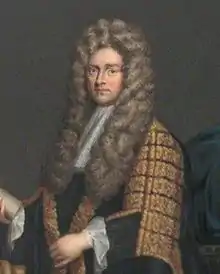 |
John Smith MP for Andover (1656–1723) |
E 23 October R 30 October 1707 |
1708[lower-alpha 1] | (1707)[2] | 1 | — |
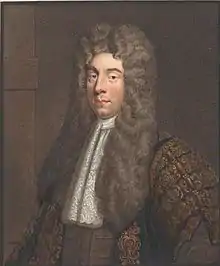 |
Sir Richard Onslow Bt MP for Surrey (1654–1717) |
E 16 November R 18 November 1708 |
1710[lower-alpha 2] | (1708)[3] | 2 | Baron Onslow |
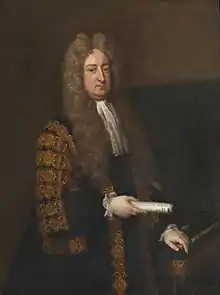 |
William Bromley MP for Oxford University (1663–1732) |
E 25 November R 27 November 1710 |
1713[lower-alpha 3] | (1710)[4] | 3 | — |
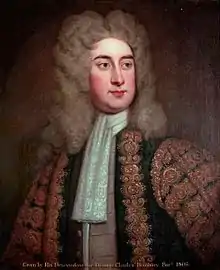 |
Sir Thomas Hanmer Bt MP for Suffolk (1677–1746) |
E 16 February R 18 February 1714 |
1715[lower-alpha 4] | (1714)[5] | 4 | — |
 |
Sir Spencer Compton KB MP for Sussex (c. 1673–1743) |
E 17 March R 21 March 1715 |
1727[lower-alpha 5] | (1715)[6] (1722)[7] |
5 6 |
Baron Wilmington |
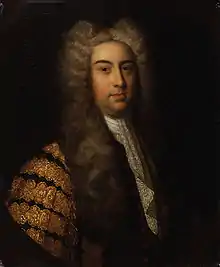 |
Arthur Onslow MP for Surrey (1691–1768) |
E 23 January R 27 January 1728 |
18 March 1761[lower-alpha 6] |
(1728)[9] (1735)[10] (1741)[11] (1747)[12] (1754)[13] |
7 8 9 10 11 |
[lower-alpha 7] |
 |
Sir John Cust Bt MP for Grantham (1718–1770) |
E 3 November R 6 November 1761 |
19 January 1770[lower-alpha 8] |
(1761)[16] (1768)[17] |
12 13 |
[lower-alpha 9] |
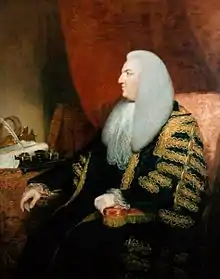 |
Sir Fletcher Norton MP for Guildford (1716–1789) |
E 22 January R 23 January 1770 |
31 October 1780[lower-alpha 10] |
1770[18] (1774)[19] |
13 14 |
Baron Grantley |
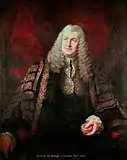 |
Charles Wolfran Cornwall MP for Winchelsea until 1784 MP for Rye from 1784 (1735–1789) |
E 31 October R 1 November 1780 |
2 January 1789† |
1780[20] (1784)[21] |
15 16 |
[lower-alpha 11] |
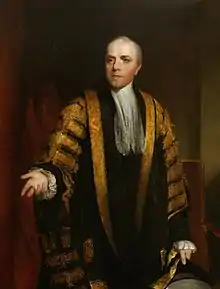 |
William Wyndham Grenville MP for Buckinghamshire (1759–1834) |
E 5 January 1789 no royal approbation[lower-alpha 12] |
5 June 1789[lower-alpha 13] |
Jan.1789[24] | 16 | Baron Grenville |
 |
Henry Addington MP for Devizes (1757–1844) |
E 8 June R 9 June 1789 |
continued as UK Speaker |
Jun.1789[25] (1790)[26] (1796)[27] |
16 17 18 |
Viscount Sidmouth |
Speakers of the House of Commons of the United Kingdom from 1801
The United Kingdom of Great Britain and Ireland was created in 1801. In 1922 the Irish Free State ceased to be part of the UK. The official name of the United Kingdom was changed to the United Kingdom of Great Britain and Northern Ireland, in 1927.
| Portrait | Name Constituency (Birth–Death) |
Term of office E: Election R: Royal approbation †: Death |
Election(s) (in brackets if unopposed) Parliament(s) |
Party[lower-alpha 14] | Retirement peerage | |||
|---|---|---|---|---|---|---|---|---|
 |
Henry Addington MP for Devizes (1757–1844) |
E 22 January R 23 January 1801 |
10 February 1801[lower-alpha 15] |
(Jan.1801)[31] | 1 | Tory | Viscount Sidmouth | |
 |
Sir John Mitford KC FRS MP for East Looe (1748–1830) |
E 11 February R 12 February 1801 |
9 February 1802[lower-alpha 16] |
(Feb.1801)[33] | 1 | Tory | Baron Redesdale | |
 |
Charles Abbot FRS MP for Helston until 1802 MP for Woodstock 1802–1806 MP for Oxford University after 1806 (1757–1829) |
E 10 February R 11 February 1802 |
2 June 1817 |
(Feb.1802)[34] (Nov.1802)[35] (1806)[36] (1807)[37] (1812)[38] |
1 2 3 4 5 |
Tory | Baron Colchester | |
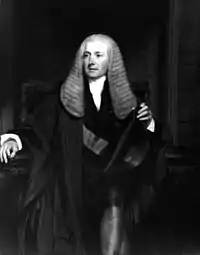 |
Sir Charles Manners-Sutton GCB MP for Scarborough until 1832 MP for Cambridge University after 1832 (1780–1845) |
E 2 June[39] R 3 June[40] 1817 |
19 February 1835[lower-alpha 17] |
1817[39] (1819)[42] (1820)[43] (1826)[44] (1830)[45] (1831)[46] 1833[47] |
5 6 7 8 9 10 11 |
Tory | Viscount Canterbury | |
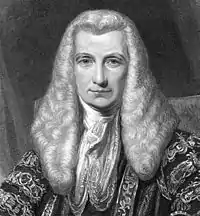 |
James Abercromby MP for Edinburgh (1776–1858) |
E 19 February[41] R 20 February[48] 1835 |
27 May 1839 |
1835[41] (1837)[49] |
12 13 |
Whig | Baron Dunfermline | |
.jpg.webp) |
Charles Shaw-Lefevre MP for North Hampshire (1794–1888) |
E 27 May[50] R 28 May[51] 1839 |
30 April 1857 |
1839[50] (1841)[52] (1847)[53] (1852)[54] |
13 14 15 16 |
Whig | Viscount Eversley | |
 |
John Evelyn Denison MP for North Nottinghamshire (1800–1873) |
E 30 April[55] R 1 May[56] 1857 |
9 February 1872 |
(1857)[55] (1859)[57] (1866)[58] (1868)[59] |
17 18 19 20 |
Liberal | Viscount Ossington | |
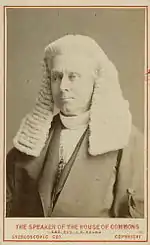 |
Sir Henry Brand GCB MP for Cambridgeshire (1814–1892) |
E 9 February[60] R 12 February[61] 1872 |
26 February 1884 |
(1872)[60] (1874)[62] (1880)[63] |
20 21 22 |
Liberal | Viscount Hampden | |
 |
Arthur Peel MP for Warwick until 1885 MP for Warwick and Leamington after 1885 (1829–1912) |
E 26 February[64] R 27 February[65] 1884 |
10 April 1895 |
(1884)[64] (Jan.1886)[66] (Aug.1886)[67] (1892)[68] |
22 23 24 25 |
Liberal | Viscount Peel | |
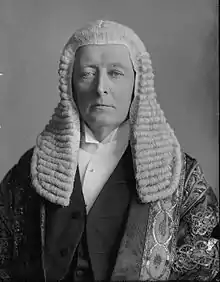 |
William Court Gully KC MP for Carlisle (1835–1909) |
E 10 April[69] R 22 April[70] 1895 |
8 June 1905 |
Apr.1895[69] (Aug.1895)[71] (1900)[72] |
25 26 27 |
Liberal | Viscount Selby | |
 |
James Lowther MP for Penrith until 1918 MP for Penrith and Cockermouth after 1918 (1855–1949) |
E 8 June[73] R 20 June[74] 1905 |
28 April 1921 |
(1905)[73] (1906)[75] (1910)[76] (1911)[77] (1919)[78] |
27 28 29 30 31 |
Conservative | Viscount Ullswater | |
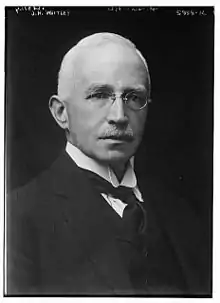 |
John Henry Whitley MP for Halifax (1866–1935) |
E & R[79] 28 April 1921 |
20 June 1928 |
(1921) (1922)[80] (Jan.1924)[81] (Dec.1924) |
31 32 33 34 |
Liberal (Coalition) |
[lower-alpha 18] | |
 |
Edward FitzRoy DL MP for Daventry (1869–1943) |
E 20 June[82] R 21 June[83] 1928 |
3 March 1943† |
(1928)[82] (1929) (1931)[84] (1935)[85] |
34 35 36 37 |
Conservative | [lower-alpha 19] | |
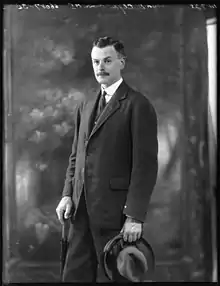 |
Douglas Clifton Brown MP for Hexham (1879–1958) |
E[86] & R[87] 9 March 1943 |
31 October 1951 |
(1943)[86] (1945)[88] (1950)[89] |
37 38 39 |
Conservative | Viscount Ruffside | |
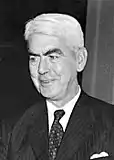 |
William Morrison MC QC MP for Cirencester and Tewkesbury (1893–1961) |
E 31 October[90] R 1 November[91] 1951 |
19 September 1959 |
1951[90] (1955)[92] |
40 41 |
Conservative | Viscount Dunrossil | |
| Sir Harry Hylton-Foster MP for Cities of London and Westminster (1905–1965) |
E 20 October[93] R 21 October[94] 1959 |
2 September 1965† |
(1959)[93] (1964)[95] |
42 43 |
Conservative | [lower-alpha 20] | ||
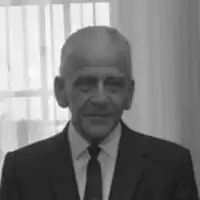 |
Horace King MP for Southampton Itchen (1901–1986) |
E[96] & R[97] 26 October 1965 |
12 January 1971 |
(1965)[96] (1966)[98] (1970)[99] |
43 44 45 |
Labour | Baron Maybray-King for Life | |
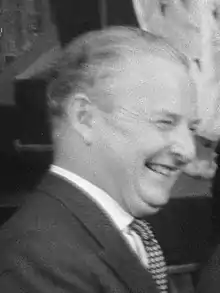 |
Selwyn Lloyd CH CBE QC DL MP for Wirral (1904–1978) |
E[100] & R[101] 12 January 1971 |
3 February 1976 |
1971[100] (Mar.1974)[102] (Oct.1974)[103] |
45 46 47 |
Conservative | Baron Selwyn-Lloyd for Life | |
| George Thomas MP for Cardiff West (1909–1997) |
E[104] & R[105] 3 February 1976 |
10 June 1983 |
(1976)[104] (1979)[106] |
47 48 |
Labour | Viscount Tonypandy | ||
| Bernard Weatherill MP for Croydon North East (1920–2007) |
E 15 June[107] R 16 June[108] 1983 |
9 April 1992 |
(1983)[107] (1987)[109] |
49 50 |
Conservative | Baron Weatherill for Life | ||
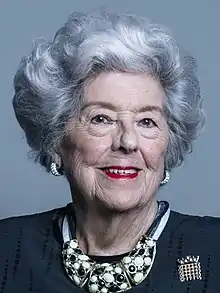 |
Betty Boothroyd MP for West Bromwich West (born 1929) |
E 27 April[110] R 28 April[111] 1992 |
23 October 2000 |
1992[110] (1997)[112] |
51 52 |
Labour | Baroness Boothroyd for Life | |
.jpg.webp) |
Michael Martin MP for Glasgow Springburn until 2005 MP for Glasgow North East after 2005 (1945–2018) |
E[113] & R[114] 23 October 2000 |
22 June 2009[lower-alpha 21] |
2000[113] (2001)[115] (2005)[116] |
52 53 54 |
Labour | Baron Martin of Springburn for Life | |
_(cropped).jpg.webp) |
John Bercow MP for Buckingham (born 1963) |
E & R 22 June 2009 |
4 November 2019 |
2009[117] (2010)[118] (2015)[119] (2017)[120] |
54 55 56 57 |
Conservative | — | |
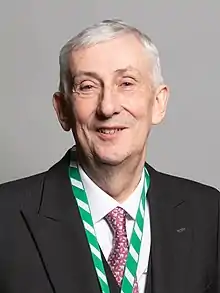 |
Sir Lindsay Hoyle[121] MP for Chorley (born 1957) |
E & R 4 November 2019 |
Incumbent | Nov.2019[122] (Dec.2019)[123] |
57 58 |
Labour | — | |
Notes
- Smith resigned from the chair to become Chancellor of the Exchequer. He continued to serve in the House of Commons until his death in 1723.
- Onslow was the last Speaker to be defeated in his constituency in a general election.
- Bromley resigned from the chair to become Secretary of State for the Northern Department. He continued to serve in the House of Commons until his death in 1732.
- Hanmer vacated the chair but continued to serve in the House of Commons until 1727.
- Compton vacated the chair but continued to serve in the House of Commons until 1728.
- Onslow retired on 18 March 1761, receiving the unanimous thanks of the House of Commons.[8]
- Onslow, the longest-serving Speaker, retired from the chair and the House of Commons. He seems to have been the last Speaker who survived his term by a significant period without being offered a peerage. His only son was created Baron Cranley in 20 May 1776, inherited the Baron Onslow on 8 October 1776 through Special Remainder.
- On 17 January 1770, Cust sent word to the House of Commons that he was too ill to attend.[14] He resigned on 19 January, and died on 24 January.[15]
- Cust died five days after his resignation, his son was created The Baron Brownlow in 1776.
- Norton was not re-elected as Speaker in 1780, but retained his seat as an MP until 1782.
- Cornwall died in office.
- Due to the illness of King George III, "the usual formalities of receiving the royal permission to elect a speaker, and the royal approbation of him when elected, could not be observed, and Grenville taking his seat immediately performed all the duties of his office."[22]
- Grenville resigned from the chair on 5 June 1789[23] to become Home Secretary. He continued to serve in the House of Commons until 1790.
- Party allegiance at the time of first election as Speaker. The modern convention is for the Speaker to sever connections with his or her former party.[28] From 1935, the Speaker has sought re-election as such, not using a party label.[29] The general convention is that the Speaker is not opposed by major party candidates at general elections.
- Addington resigned from the chair on 10 February 1801[30] to become Prime Minister. He continued to serve in the House of Commons until 1805.
- Mitford resigned from the chair on 9 February 1802[32] to become the Lord High Chancellor of Ireland.
- In 1835 he was defeated for re-election as Speaker,[41] but retained his seat as an MP for a few weeks until he was created a peer. No subsequent Speaker has been defeated or remained in the House of Commons, for more than a few days after leaving the chair.
- Whitley declined the customary peerage upon his retirement from the chair and the House of Commons.
- Fitzroy died in office. His widow was created The Viscountess Daventry.
- Hylton-Foster died in office. His widow was created The Baroness Hylton-Foster for Life.
- Martin resigned the speakership in 2009. He was the first Speaker to be forced to leave the chair by public pressure since Sir John Trevor was expelled from the House and the chair in 1695.
References
- Smith, Henry Stooks (1845). "Elections for Speaker". The Parliaments of England. 2. p. 205. Retrieved 17 November 2019.
- Cobbett, (1810) vol. 6, pp. 589–594
- Cobbett, (1810) vol. 6, pp. 744–752
- Cobbett, (1810) vol. 6, pp. 918–927
- Cobbett, (1810) vol. 6, pp. 1242–1256
- Cobbett, (1811) vol. 7, pp. 27, 38–42
- Cobbett, (1811) vol. 8, pp. 1, 21–25
- Cobbett, (1813) vol. 16, p. 1013–1015
- Cobbett, (1811) vol. 8, pp. 607–608, 629–634
- Cobbett, (1811) vol. 9, pp. 615–616, 634–639
- Cobbett, (1812) vol. 12, pp. 188–192, 214–221
- Cobbett, (1813) vol. 14, pp. 67, 87–94
- Cobbett, (1813) vol. 15, pp. 293–294, 322–328
- Cobbett, (1813) vol. 16, p. 733
- Barker, G. F. R. (1888). . In Stephen, Leslie (ed.). Dictionary of National Biography. 13. London: Smith, Elder & Co.
- Cobbett, (1813) vol. 15, pp. 1072–1073, 1100–1106
- Cobbett, (1813) vol. 16, pp. 424–425, 454–460
- Cobbett, (1813) vol. 16, pp. 734–741
- Cobbett, (1813) vol. 18, pp. 1–5, 31–33
- Cobbett, (1814) vol. 21, pp.768–769, 793–807
- Cobbett, (1815) vol. 24, pp. 775, 800–804
- Barker, G. F. R. (1890). . In Stephen, Leslie; Lee, Sidney (eds.). Dictionary of National Biography. 23. London: Smith, Elder & Co.
- Cobbett, (1816) vol. 28, p. 147
- Journals of the House of Commons. 44. 1788. p. 45. Retrieved 15 November 2019.
- Cobbett, (1816) vol. 28, pp. 148–157
- Cobbett, (1816) vol. 28, pp. 876–880
- Cobbett, (1818) vol. 32, pp. 1158–1161
- "Speakers must be politically impartial. Therefore, on election the new Speaker must resign from their political party and remain separate from political issues even in retirement. However, the Speaker will deal with their constituents' problems like a normal MP." cf
- Craig, F.W.S. (1989). British Electoral Facts 1832–1987. Politico's Publishing. ISBN 978-0-900178-30-6.
- Cobbett, (1819) vol. 35, pp. 946–947
- Cobbett, (1819) vol. 35, pp. 859–864
- Cobbett, (1820) vol. 36, pp. 314–315
- Cobbett, (1819) vol. 35, pp. 948–955
- Cobbett, (1820) vol. 36, pp. 315–321
- Cobbett, (1820) vol. 36, pp. 914–919
- "Choice of a Speaker". Parliamentary Debates (Hansard). 8. House of Commons. 15 December 1806. col. 3–12.
- "Choice of a Speaker". Parliamentary Debates (Hansard). 9. House of Commons. 22 June 1807. col. 567–74.
- "Choice of a Speaker". Parliamentary Debates (Hansard). 24. House of Commons. 24 November 1812. col. 2–8.
- "Choice of a Speaker". Parliamentary Debates (Hansard). 36. House of Commons. 2 June 1817. col. 843–55.
- "The New Speaker Approved by the Prince Regent". Parliamentary Debates (Hansard). 36. House of Lords. 3 June 1817. col. 856–7.
- "Choice of a Speaker". Parliamentary Debates (Hansard). 26. House of Commons. 19 February 1835. col. 3–59.
- "Choice of a Speaker". Parliamentary Debates (Hansard). 39. House of Commons. 14 January 1819. col. 3–15.
- "Choice of a Speaker". Parliamentary Debates (Hansard). 1. House of Commons. 21 April 1820. col. 2–9.
- "Choice of a Speaker". Parliamentary Debates (Hansard). 16. House of Commons. 14 November 1826. col. 2–7.
- "Choice of a Speaker". Parliamentary Debates (Hansard). 1. House of Commons. 26 October 1830. col. 2–5.
- "Choice of a Speaker". Parliamentary Debates (Hansard). 4. House of Commons. 14 June 1831. col. 73–79.
- "Choice of a Speaker". Parliamentary Debates (Hansard). 15. House of Commons. 29 January 1833. col. 35–83.
- "His Majesty's Approval of the Speaker". Parliamentary Debates (Hansard). 26. House of Lords. 20 February 1835. col. 61–63.
- "Opening of Parliament – Choice of a Speaker". Parliamentary Debates (Hansard). 39. House of Commons. 15 November 1837. col. 3–12.
- "Election of Speaker". Parliamentary Debates (Hansard). 47. House of Commons. 27 May 1839. col. 1034–56.
- "Royal Approbation of the Speaker". Parliamentary Debates (Hansard). 47. House of Lords. 28 May 1839. col. 1056–7.
- "Election of Speaker". Parliamentary Debates (Hansard). 59. House of Commons. 19 August 1841. col. 3–11.
- "Election of Speaker". Parliamentary Debates (Hansard). 95. House of Commons. 18 November 1847. col. 3–8.
- "Election of Speaker". Parliamentary Debates (Hansard). 123. House of Commons. 4 November 1852. col. 3–13.
- "Choice of a Speaker". Parliamentary Debates (Hansard). 145. House of Commons. 30 April 1857. col. 4–11.
- "Presented and Approved". Parliamentary Debates (Hansard). 145. House of Lords. 1 May 1857. col. 12–13.
- "Choice of a Speaker". Parliamentary Debates (Hansard). 154. House of Commons. 31 May 1859. col. 4–10.
- "Choice of a Speaker". Parliamentary Debates (Hansard). 181. House of Commons. 1 February 1866. col. 4–17.
- "Choice of a Speaker". Parliamentary Debates (Hansard). 194. House of Commons. 10 December 1868. col. 4–11.
- "Choice of a Speaker". Parliamentary Debates (Hansard). 209. House of Commons. 9 February 1872. col. 181–91.
- "Presented and Approved". Parliamentary Debates (Hansard). 209. House of Lords. 12 February 1872. col. 191–2.
- "Choice of a Speaker". Parliamentary Debates (Hansard). 218. House of Commons. 5 March 1874. col. 5–14.
- "Choice of a Speaker". Parliamentary Debates (Hansard). 252. House of Commons. 29 April 1880. col. 5–14.
- "Election of a Speaker". Parliamentary Debates (Hansard). 285. House of Commons. 26 February 1884. col. 17–30.
- "Speaker of the House of Commons". Parliamentary Debates (Hansard). 285. House of Lords. 27 February 1884. col. 30–31.
- "Election of a Speaker". Parliamentary Debates (Hansard). 302. House of Commons. 12 January 1886. col. 5–18.
- "Election of a Speaker". Parliamentary Debates (Hansard). 308. House of Commons. 5 August 1886. col. 4–12.
- "Election of a Speaker". Parliamentary Debates (Hansard). 7. House of Commons. 4 August 1892. col. 5–16.
- "Election of Speaker". Parliamentary Debates (Hansard). 32. House of Commons. 10 April 1895. col. 1369–96.
- "Speaker of the House of Commons". Parliamentary Debates (Hansard). 32. House of Lords. 22 April 1895. col. 1397–8.
- "Election of Speaker". Parliamentary Debates (Hansard). 36. House of Commons. 12 August 1895. col. 4–10.
- "Election of Speaker". Parliamentary Debates (Hansard). 88. House of Commons. 3 December 1900. col. 4–12.
- "Election of Speaker". Parliamentary Debates (Hansard). 147. House of Commons. 8 June 1905. col. 1064–76.
- "Speaker of the House of Commons". Parliamentary Debates (Hansard). 147. House of Lords. 20 June 1905. col. 1077–8.
- "Election of Speaker". Parliamentary Debates (Hansard). 152. House of Commons. 13 February 1906. col. 4–12.
- "Preamble". Parliamentary Debates (Hansard). 14. House of Commons. 15 February 1910. col. 1–12.
- "Preamble". Parliamentary Debates (Hansard). 21. House of Commons. 31 January 1911. col. 1–18.
- "Preamble". Parliamentary Debates (Hansard). 112. House of Commons. 4 February 1919. col. 1–16.
- "Speaker of the House of Commons". Parliamentary Debates (Hansard). 45. House of Lords. 28 April 1921. col. 76–77.
- "Summary of Day". Parliamentary Debates (Hansard). 159. House of Commons. 20 November 1922. col. 1–12.
- "Preamble". Parliamentary Debates (Hansard). 169. House of Commons. 8 January 1924. col. 1–16.
- "Election of Speaker". Parliamentary Debates (Hansard). 218. House of Commons. 20 June 1928. col. 1719–28.
- "Speaker of the House of Commons". Parliamentary Debates (Hansard). 71. House of Lords. 21 June 1928. col. 613–4.
- "Preamble". Parliamentary Debates (Hansard). 259. House of Commons. 3 November 1931. col. 1–12.
- "Preamble". Parliamentary Debates (Hansard). 307. House of Commons. 26 November 1935. col. 1–12.
- "Election of Speaker". Parliamentary Debates (Hansard). 387. House of Commons. 9 March 1943. col. 613–30.
- "Speaker of the House of Commons". Parliamentary Debates (Hansard). 126. House of Lords. 9 March 1943. col. 498–9.
- "Preamble". Parliamentary Debates (Hansard). 413. House of Commons. 1 August 1945. col. 1–14.
- "Election of Speaker". Parliamentary Debates (Hansard). 472. House of Commons. 1 March 1950. col. 2–10.
- "Election of Speaker". Parliamentary Debates (Hansard). 493. House of Commons. 31 October 1951. col. 2–24.
- "Speaker of the House of Commons". Parliamentary Debates (Hansard). 174. House of Lords. 1 November 1951. col. 3–4.
- "Election of Speaker". Parliamentary Debates (Hansard). 542. House of Commons. 7 June 1955. col. 1–12.
- "Election of Speaker". Parliamentary Debates (Hansard). 612. House of Commons. 20 October 1959. col. 2–18.
- "Speaker of the House of Commons". Parliamentary Debates (Hansard). 219. House of Lords. 21 October 1959. col. 7–8.
- "Election of Speaker". Parliamentary Debates (Hansard). 701. House of Commons. 27 October 1964. col. 2–10.
- "Election of Speaker". Parliamentary Debates (Hansard). 718. House of Commons. 26 October 1965. col. 1–17.
- "Speaker of the House of Commons". Parliamentary Debates (Hansard). 269. House of Lords. 26 October 1965. col. 549–50.
- "Election of Speaker". Parliamentary Debates (Hansard). 727. House of Commons. 18 April 1966. col. 2–16.
- "Election of Speaker". Parliamentary Debates (Hansard). 803. House of Commons. 29 June 1970. col. 2–14.
- "Election of Speaker". Parliamentary Debates (Hansard). 809. House of Commons. 12 January 1971. col. 1–34.
- "Speaker of the House of Commons". Parliamentary Debates (Hansard). 314. House of Lords. 12 January 1971. col. 51–52.
- "Election of Speaker". Parliamentary Debates (Hansard). 870. House of Commons. 6 March 1974. col. 2–16.
- "Election of Speaker". Parliamentary Debates (Hansard). 880. House of Commons. 22 October 1974. col. 2–15.
- "Election of Speaker". Parliamentary Debates (Hansard). 904. House of Commons. 3 February 1976. col. 1151–70.
- "Speaker of the House of Commons". Parliamentary Debates (Hansard). 367. House of Lords. 3 February 1976. col. 1256–7.
- "Election of Speaker". Parliamentary Debates (Hansard). 967. House of Commons. 9 May 1979. col. 2–18.
- "Election of Speaker". Parliamentary Debates (Hansard). 44. House of Commons. 15 June 1983. col. 2–16.
- "Speaker of the House of Commons". Parliamentary Debates (Hansard). 443. House of Lords. 16 June 1983. col. 3–4.
- "Election of Speaker". Parliamentary Debates (Hansard). 118. House of Commons. 17 June 1987. col. 2–14.
- "Election of Speaker". Parliamentary Debates (Hansard). 207. House of Commons. 27 April 1992. col. 2–26.
- "Speaker of the House of Commons". Parliamentary Debates (Hansard). 537. House of Lords. 28 April 1992. col. 3–4.
- "Election of Speaker". Parliamentary Debates (Hansard). 294. House of Commons. 7 May 1997. col. 2–12.
- "Election of Speaker". Parliamentary Debates (Hansard). 355. House of Commons. 23 October 2000. col. 1–106.
- "Speaker of the House of Commons". Parliamentary Debates (Hansard). 618. House of Lords. 23 October 2000. col. 119–20.
- "Election of Speaker". Parliamentary Debates (Hansard). 370. House of Commons. 13 June 2001. col. 2–10.
- "House of Commons Hansard Debates for 11 May 2005 (pt 1)". Hansard. Retrieved 17 December 2019.
- "Election of Speaker". Hansard. Retrieved 17 December 2019.
- "Election of Speaker". Hansard. Retrieved 17 December 2019.
- "Election of Speaker". Hansard. Retrieved 17 December 2019.
- "Election of Speaker". Hansard. Retrieved 17 December 2019.
- "Hoyle re-elected Commons Speaker as MPs return". BBC News. 17 December 2019. Retrieved 31 March 2020.
- "Election of Speaker". Hansard. Retrieved 17 December 2019.
- "Election of Speaker". Hansard. Retrieved 17 December 2019.
Bibliography
- Laundy, Philip (1964). The Office of Speaker. Cassell & Company.
- Marsden, Philip (1979). The Officers of the Commons 1363–1978. Her Majesty's Stationery Office.
- Butler, David; Butler, Gareth (2000). Twentieth Century Political Facts 1900–2000 (Hardcover ed.). Macmillan Press. ISBN 0-333-77221-0.
- Cobbett, Richard. The Parliamentary History of England.CS1 maint: ref=harv (link)
- Cook, Chris; Keith, Brendan (1975). British Historical Facts 1830–1900. Macmillan Press.
- Cook, Chris; Stevenson, John (1980). British Historical Facts 1760–1830. Macmillan Press. ISBN 0-333-21512-5.
- Venning, Timothy (2005). Compendium of British Office Holders. Palgrave Macmillan. ISBN 978-1-4039-2045-4.
.svg.png.webp)